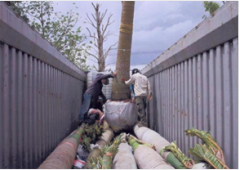Difference between revisions of "Live Trees"
m (→Shipment / Storage) |
|||
| (One intermediate revision by one other user not shown) | |||
| Line 14: | Line 14: | ||
<b>Logs/[[Timber]]/Wood/Poles: </b><br> | <b>Logs/[[Timber]]/Wood/Poles: </b><br> | ||
Logs are preferably to be loaded on either flatracks, ATD's or Open Top containers. If logs are loaded in dry containers following guidelines MUST be adhered to:<br><br> | Logs are preferably to be loaded on either flatracks, ATD's or Open Top containers. If logs are loaded in dry containers following guidelines MUST be adhered to:<br><br> | ||
| − | * | + | * Logs are to be dry when being stuffed. |
| − | * | + | * Logs lying in a pool of water are not be loaded. |
| − | * | + | * In order to minimize the risk of damage to containers, logs are to be loaded with the assistance of special log handling cranes or log loaders. |
| − | * | + | * Logs should not be pushed into the containers using a forklift, as experience shows this will damage the container. |
| − | * | + | * Logs are not to be dragged out of the containers. |
| − | * | + | * Booking offices must obtain approval from shippers that they will cover possible damage during stuffing. |
| − | * | + | * Discharge port(s) must obtain approval from the consignee before delivery, that they will cover any damages caused during unloading. <br><br> |
Loading in Open Top containers is only allowed provided the loading and unloading can take place through the opening in the top, AND that the logs can be securely fastened by means of the lashing points inside the container. <br><br> | Loading in Open Top containers is only allowed provided the loading and unloading can take place through the opening in the top, AND that the logs can be securely fastened by means of the lashing points inside the container. <br><br> | ||
If loaded on Flat Racks or ATD's the logs have to be secured with an adequate number of chains. The vessel may reject loading of Flat Racks / ATD's with inadequate lashing.<br><br> | If loaded on Flat Racks or ATD's the logs have to be secured with an adequate number of chains. The vessel may reject loading of Flat Racks / ATD's with inadequate lashing.<br><br> | ||
| − | Poles/logs treated with creosote oil or similar, are acceptable provided that necessary steps are taken in order to prevent any leaking from coming in | + | Poles/logs treated with creosote oil or similar, are acceptable provided that necessary steps are taken in order to prevent any leaking from coming in contact with the floor. Creosoted poles/woods are never to be loaded in a closed DC but on Flat Racks / ATD's. The container is to be lined with a thick polyethylene plastic sheet on the floor and extending up the sides of the cargo. <br><br> |
Furthermore WOOD PRESERVATIVES are classed as Hazardous under IMDG Code<br><br> | Furthermore WOOD PRESERVATIVES are classed as Hazardous under IMDG Code<br><br> | ||
Special import rules apply for China / Europe | Special import rules apply for China / Europe | ||
Latest revision as of 13:10, 14 January 2021
| Infobox on Live Trees | |
|---|---|
| Example of Live Trees |  |
| Facts | |
| Origin | - |
| Stowage factor (in m3/t) | - |
| Humidity / moisture | - |
| Ventilation | - |
| Risk factors | See text |
Live Trees
Contents
Shipment / Storage
Live Trees / Plants
Trees loaded on special equipment (flatrack, open top) should be placed in a protective stow or "well" affording protection from forward & sides.
Palm plants
Palms are plants and not trees and can be carried in e.g. open tops in, depending their size, sleeping positions.
Logs/Timber/Wood/Poles:
Logs are preferably to be loaded on either flatracks, ATD's or Open Top containers. If logs are loaded in dry containers following guidelines MUST be adhered to:
- Logs are to be dry when being stuffed.
- Logs lying in a pool of water are not be loaded.
- In order to minimize the risk of damage to containers, logs are to be loaded with the assistance of special log handling cranes or log loaders.
- Logs should not be pushed into the containers using a forklift, as experience shows this will damage the container.
- Logs are not to be dragged out of the containers.
- Booking offices must obtain approval from shippers that they will cover possible damage during stuffing.
- Discharge port(s) must obtain approval from the consignee before delivery, that they will cover any damages caused during unloading.
Loading in Open Top containers is only allowed provided the loading and unloading can take place through the opening in the top, AND that the logs can be securely fastened by means of the lashing points inside the container.
If loaded on Flat Racks or ATD's the logs have to be secured with an adequate number of chains. The vessel may reject loading of Flat Racks / ATD's with inadequate lashing.
Poles/logs treated with creosote oil or similar, are acceptable provided that necessary steps are taken in order to prevent any leaking from coming in contact with the floor. Creosoted poles/woods are never to be loaded in a closed DC but on Flat Racks / ATD's. The container is to be lined with a thick polyethylene plastic sheet on the floor and extending up the sides of the cargo.
Furthermore WOOD PRESERVATIVES are classed as Hazardous under IMDG Code
Special import rules apply for China / Europe











